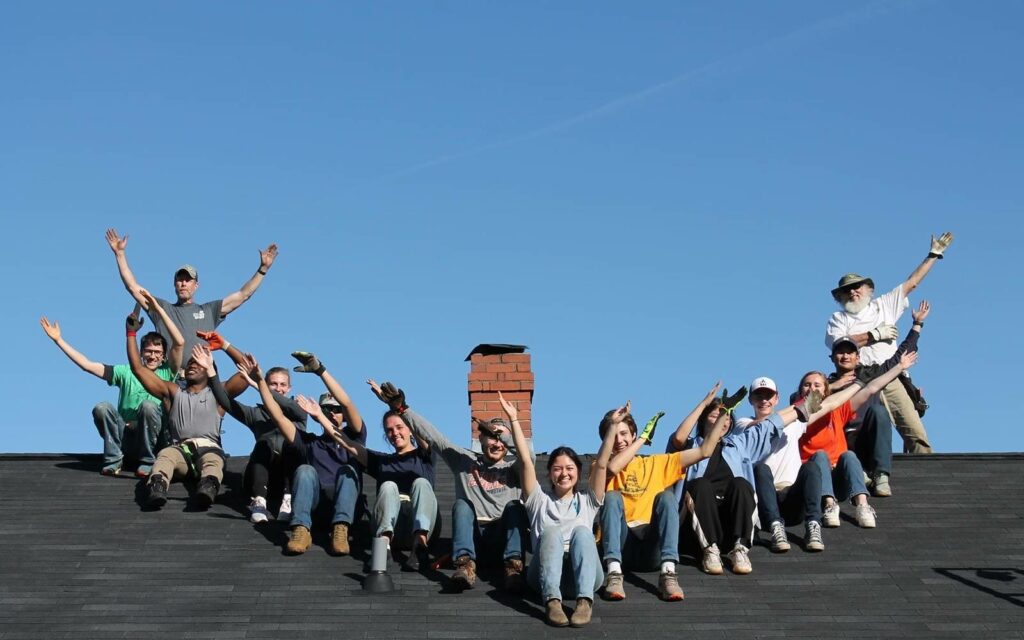DRIVE Fund
Call to Action
UNC Greensboro’s Office of Sustainability is calling for collective action from employees, students, and alumni to help reduce the University’s carbon footprint and concurrently improve housing conditions for Guilford County residents.
The new Spartan DRIVE Fund (Drivers Reducing Individual Vehicle Emissions) invites campus stakeholders to contribute $15 annually to offset their commuter emissions. A carbon offset is a reduction or removal of carbon dioxide or other greenhouse gasses in one place in order to compensate for emissions made elsewhere.
Participants are also encouraged to offset emissions from past years. However long you’ve worked or studied at UNCG, if you drive to campus in a vehicle with an internal combustion engine, you have contributed to our emissions every year. UNCG has been measuring its carbon footprint since 2009. For example, if you’ve worked at UNCG for 5 years, you can offset your emissions for $75!
How it Works
The UNC System Sustainability Policy directs universities to become carbon neutral by 2050. To date, UNC Greensboro has achieved a 14% reduction in greenhouse gas emissions (GHG) since 2009.
UNCG’s carbon footprint has three major contributors:
- emissions from employee and student commuters (18%)
- emissions from the generation of electricity purchased from Duke Energy (32%)
- emissions from fuels like natural gas, gasoline, and propane burned on campus for energy (30%)
The average UNCG commuter is responsible for 1 ton of greenhouse gas (GHG) emissions every year just for their travel to and from campus, which added up to 11,870 tons of CO2 in FY22 or approximately 18% of the university’s total carbon footprint.
Contributions to the new Spartan DRIVE Fund will be invested in energy efficiency projects on campus to help reduce the University’s carbon footprint. UNCG participates in the State’s Utility Savings Carry Forward program (HB 1292), which allows the university to reinvest avoided utility costs achieved from energy efficiency projects implemented on state property. To date, UNCG Facilities has saved over $5.7 million dollars in avoided utility costs since 2015 by participating in the program. They saved $1.1 million in 2022 alone. Energy efficiency projects are responsible for 50% of our emissions reductions!
Projects funded by the Spartan DRIVE Fund will contribute to the university’s HB 1292 participation. The average return on investment for many energy efficient projects on campus is approximately 5 years. So your contribution to the Spartan DRIVE Fund will continue to pay dividends a decade from now. You can also help us continue to track commuter emissions by taking 5 minutes to participate in our Commuter Survey.
Equity, Diversity, and Inclusion

Ten percent (10%) of all funds raised will support Community Housing Solutions (CHS), a local non-profit that provides home weatherization repairs to Guilford County homeowners, who are at or under 80% of the poverty line. DRIVE Fund members will also have the opportunity to volunteer every semester to work on one of the homes sponsored by the program, giving Spartans the opportunity to put the University’s motto of service into action.
CHS makes homes more energy efficient and lowers utility costs by air sealing the home, adding insulation, repairing heating ductwork, or replacing inefficient heating systems. This results in an average savings of 25% per month for the homeowner. This equates to savings of approximately $600-$700 per year – money that can be used to put food on the table or to purchase needed medications. These repairs directly reduce the severe cost burden experienced by so many low-income families in Greensboro.
CHS is certified by the Department of Housing and Urban Development as a Community Housing Development Organization, a community-based service organization established to develop affordable housing or carry out other qualified initiatives. CHDO certification is necessary to become eligible for certain federal funds available for community development.
According to the Healthy North Carolina 2030 Report, “Housing quality is an important determinant of overall health and well-being. Studies show that there is a direct link between housing quality and physical and mental health. In North Carolina, 1 in 6 households across the state face severe housing problems, which means that at least one of the following problems is present: overcrowding, high housing costs, or lack of kitchen and/or plumbing facilities”.
Community Housing Solutions strives to build diversity, equity, and inclusion into our daily culture by fostering collaboration, supporting new ideas and welcoming all. 33% of CHS’s Board is made up of members from the low-income communities they serve.
CHS values the voices and perspectives of all employees and people they work with. They create opportunities for their employees, board members, partners, homeowners, and the community to share open and honest feedback. Bringing together these unique differences, backgrounds, and perspectives allows conversations and ideas to be richer, more refined, and more representative.

